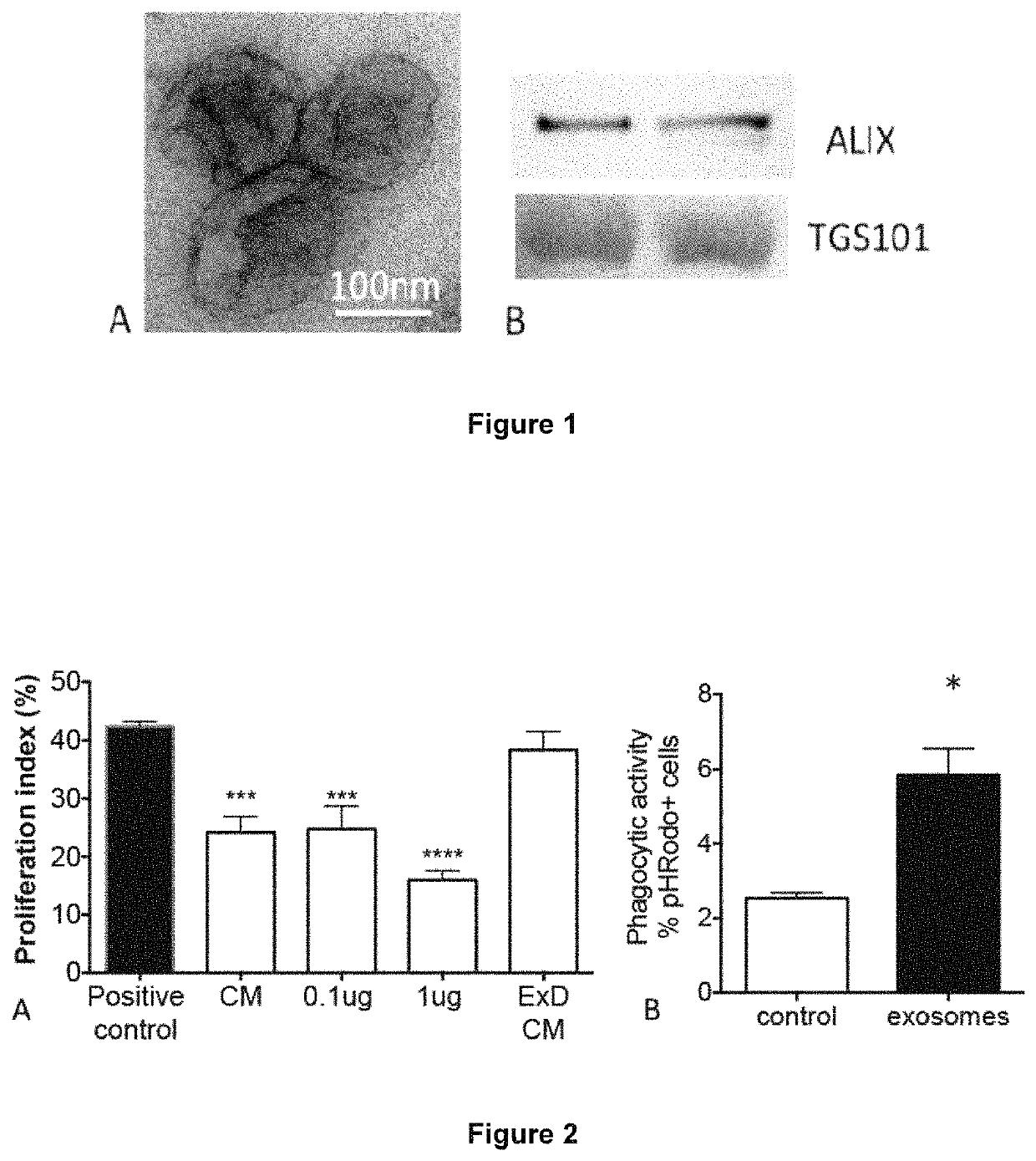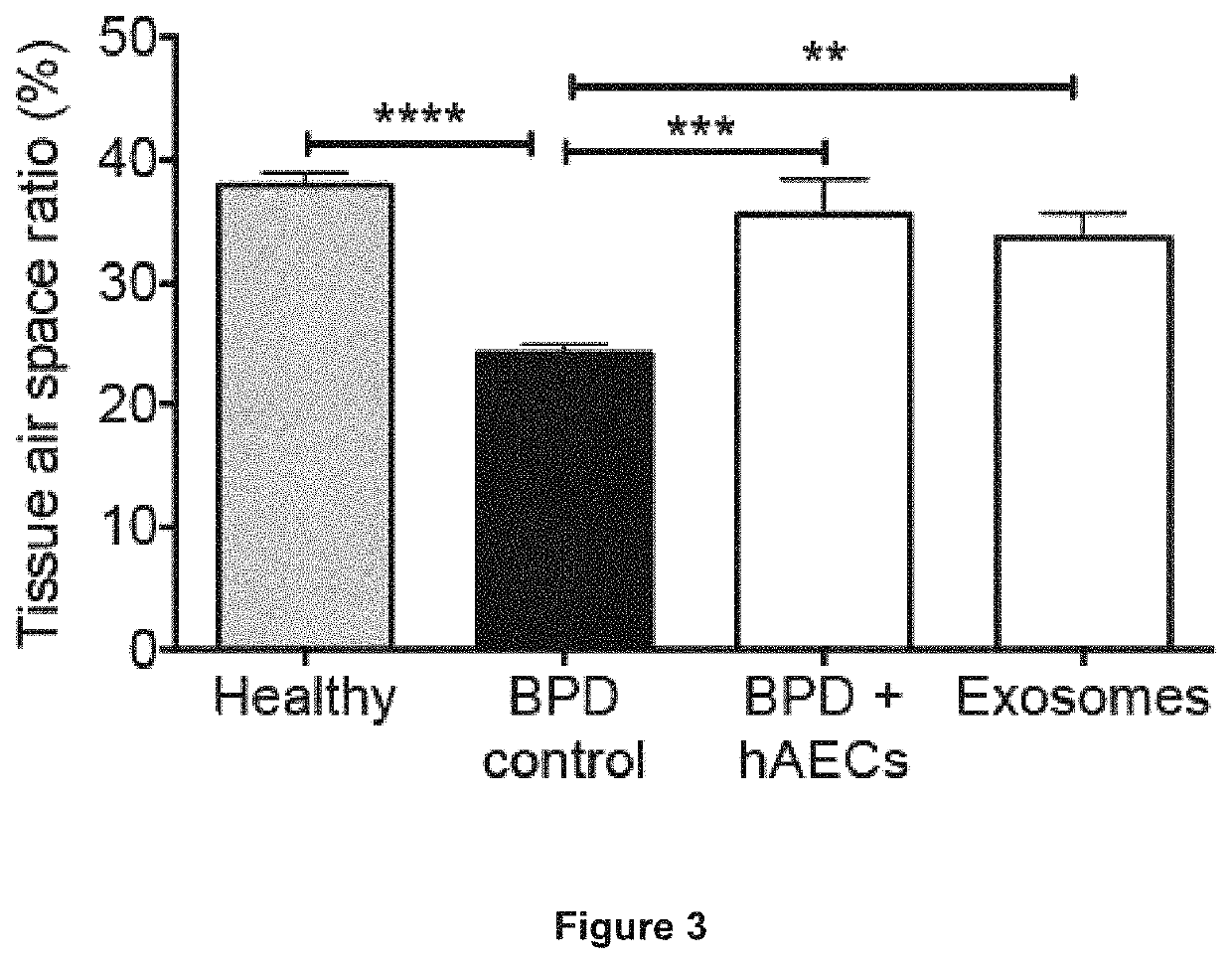Method of treatment
a treatment method and mammalian technology, applied in the field of mammalian subjects, can solve the problems of affecting off-target physiological effects, and affecting the use of cells, and achieve the effect of preventing oxygen toxicity
- Summary
- Abstract
- Description
- Claims
- Application Information
AI Technical Summary
Benefits of technology
Problems solved by technology
Method used
Image
Examples
example 1
Production of Amniotic Exosomes
[0104]A protocol is developed to isolate amniotic exosomes (FIG. 1). This is the first description of amniotic exosomes and verification of their biological activity. Primary isolates of hAECs are cultured in serum-free media (Ultraculture media, Lonza) for 96 hours before the cells are removed and conditioned media processed for exosome isolation via serial ultracentrifugation at 110,000 g. Approximately 1.5-2 μg purified exosomes per million hAECs are consistently purified regardless of gestational age. This can be scaled up in bioreactor-style cultures without contamination by apoptotic bodies.
[0105]The ability of the amniotic exosomes to exert a similar effect was tested. Amniotic exosomes suppress T cell proliferation to a similar extent as hAEC conditioned media, with apparent dose effect (0.1 μg vs 1 μg). Depletion of exosomes from hAEC conditioned media (ExD CM) abolished this effect (FIG. 2A), indicating that amniotic exosomes are a major medi...
example 2
Activity of Amniotic Exosomes
[0106]It was determined whether amniotic exosomes were functional in vivo. An aliquot of 1 μg of amniotic exosomes were injected intravenously to BPD mice at postnatal day 4 and an assessment of tissue:airspace ratio performed at postnatal day 14. Amniotic exosomes were effective in reversing alveolar simplification (FIG. 3). Amniotic exosomes play a major role by which they prevent or reverse detrimental changes to lung architecture—by reducing alveolar simplification and recruiting endogenous stem cells, while resolving inflammation in BPD mice.
[0107]In summary, the data indicate that amniotic exosomes modulate host immunological events and lung repair in a manner similar to their parent cells. It is proposed that amniotic exosomes can recapitulate the regenerative capabilities of hAECs in vivo. By uncovering the nature of the amniotic exosomal cargo, they can be used to exert a profound immunomodulatory and pro-reparative effect.
[0108]A mouse model of...
example 3
Reparative Effects of Amniotic Exosomes in BPD Mice
[0109]Data indicate that amniotic exosomes exert immunomodulatory and proregenerative effects in vitro and in vivo. To understand how amniotic exosomes affect cellular crosstalk during repair and determined whether amniotic exosomes alone are sufficient to recapitulate the reparative effects of hAECs in an animal model of BPD, the effects of two doses of amniotic exosomes (1 μg and 10 μg) are compared against an optimized dose of hAECs. Fibroblasts and fibroblast exosomes are used as controls.
[0110]A mouse model of BPD is used, which combines two major contributing factors to human BPD—perinatal inflammation and postnatal hyperoxia—to assess the effects of term and preterm amniotic exosomes on lung repair. While there are limitations to modelling a complex disease like BPD using rodents, this model lends itself to detailed molecular analysis. Rodent studies allow relative affordability for the assessment of dose effects, and long te...
PUM
 Login to View More
Login to View More Abstract
Description
Claims
Application Information
 Login to View More
Login to View More - R&D
- Intellectual Property
- Life Sciences
- Materials
- Tech Scout
- Unparalleled Data Quality
- Higher Quality Content
- 60% Fewer Hallucinations
Browse by: Latest US Patents, China's latest patents, Technical Efficacy Thesaurus, Application Domain, Technology Topic, Popular Technical Reports.
© 2025 PatSnap. All rights reserved.Legal|Privacy policy|Modern Slavery Act Transparency Statement|Sitemap|About US| Contact US: help@patsnap.com



